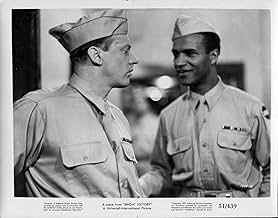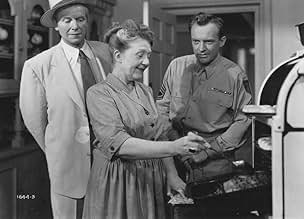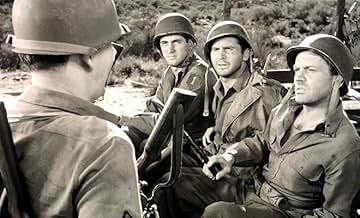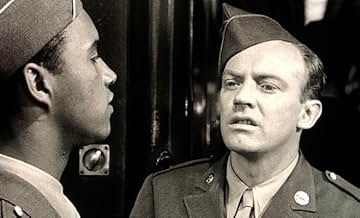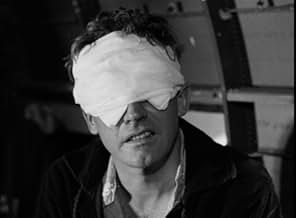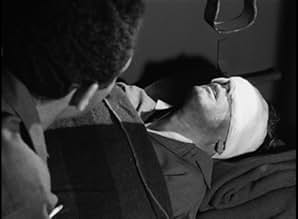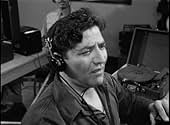IMDb RATING
7.3/10
1.2K
YOUR RATING
After he gets blinded by a German sniper's bullet in 1943, Sergeant Larry Nevins begins the long and painful road to recovery.After he gets blinded by a German sniper's bullet in 1943, Sergeant Larry Nevins begins the long and painful road to recovery.After he gets blinded by a German sniper's bullet in 1943, Sergeant Larry Nevins begins the long and painful road to recovery.
- Nominated for 2 Oscars
- 5 wins & 6 nominations total
Julie Adams
- Chris Paterson
- (as Julia Adams)
- Director
- Writers
- All cast & crew
- Production, box office & more at IMDbPro
7.31.1K
1
2
3
4
5
6
7
8
9
10
Featured reviews
Kennedy is marvelous
Reminds me more of Pride of the Marines than Best Years of Their Lives. Blinded returning vet has to readjust. Arthur Kennedy never was better than in this movie. The ending in this cynical age seems too upbeat, but such endings DID happen. See: The Men with Brando for another crippled returning vet film.
Moving Post WWII Drama
In "Dark Victory" the lead goes blind and faces encroaching death. In "Bright Victory" the lead's already blind and faces encroaching life.
The latter seems far more challenging.
Arthur Kennedy's Oscar-nominated performance as Larry buoys this film from start to finish. His excellent naturalistic style is perfect for the returning disabled vet.
Peggy Dow (as Judy) and Julie Adams (as Chris) are both fine as the women in Larry's life. The script is so sensitively written that both female characters are totally believable in their motivations.
James Edwards delivers his usual solid work as Joe, Larry's best friend.
Mark Robson's direction is efficient and level headed, and the photography, editing and music are all extremely tasteful.
This is one of Authur Kennedy's finest hours, amongst a distinguished body of work during a most versatile career.
The latter seems far more challenging.
Arthur Kennedy's Oscar-nominated performance as Larry buoys this film from start to finish. His excellent naturalistic style is perfect for the returning disabled vet.
Peggy Dow (as Judy) and Julie Adams (as Chris) are both fine as the women in Larry's life. The script is so sensitively written that both female characters are totally believable in their motivations.
James Edwards delivers his usual solid work as Joe, Larry's best friend.
Mark Robson's direction is efficient and level headed, and the photography, editing and music are all extremely tasteful.
This is one of Authur Kennedy's finest hours, amongst a distinguished body of work during a most versatile career.
10g2608671
Excellent movie
I first saw this movie as a kid in the early 60's at my dad's suggestion. He wanted me to pay attention to the real story, that being that racism has no place in a free society. I did pay attention, and to this day, his instance that I watch the movie for content is among the fondest memories I have of my Dad. He taught me how to hunt, fish, drive a car, paint a house and respect people. It is all the more remarkable, especially since I grew up in an all white town in western PA. Also, I now live no more than a few hundred yards where the movie was made. The former VF Army Hospital is now mostly under the ownership of the VF Christian College - a great resource and an asset to our community. When my family moved here some 20 years ago, we immediately discovered the "old army base" and I frequently took our kids there to walk, play on the falling down miniature golf course and just try to imagine what the facility was like when it was in use (swimming pool, gymnasium, small duck pin bowing alley, full size golf course and two fishing ponds)-- and what the presence of the base meant to Phoenixville then. I actually played handball on that court that Artuhr Kennedy is tested on for obstacle perception. The facility specialized in head and eye injuries and had a very substantial psychiatric ward as well. Anyhow, along with the anti-racism message umbered in the movie, I enjoy the scenes of the old hospital and reflect on what it looks like now. And of course,-- the scenes of old Phoenixville, although way before my time, bring a sense of nostalgia to me that is hard to describe not being a native of the area. None the less, it's there. As an aside, for anyone who is interested; Phoenixville is where they filmed The Blob with Steve McQueen -- the Colonial theater still stands to this day and has become a landmark. Oddly enough, McQueen and Kennedy would appear together in Nevada Smith years later. It is indeed a small world.
A blind man has his eyes opened
Arthur Kennedy is Larry, a man blinded in WW II battle in "Bright Victory," a 1951 film that also stars Peggy Dow, Julia Adams, James Edwards, Will Geer, Jim Backus, and Larry Keating.
Kennedy plays a southern racist whose life plan of marrying his high school sweetheart (Adams) and joining her wealthy father's business comes into doubt when he is shot and his optic nerve shattered during combat.
The film takes the viewer through Larry's training with other blind soldiers as he learns to adjust to a sightless life. One of the men, Joe (Edwards) is black and is his best buddy until Larry makes a bigoted remark (and uses the n word for extra emphasis).
A fellow soldier points out to him that from now on, he probably won't want to ask someone's race and religion before deciding if they pass muster. This sets Larry thinking.
He meets a sympathetic young woman, Judy (Dow), who falls for him but has to let him go home to the life he has there. But when Larry returns to his family, he finds that because he's changed, the world around him has changed, too.
This looks to be a B movie but Kennedy received an Oscar nomination for Best Actor, and the acting in the film is A quality, as is the script and direction. Kennedy is excellent and does one thing, I believe intentionally, that is remarkable. At least to these ears, he has no southern accent in the beginning of the film. When he returns home, you start to hear a southern accent in his voice.
Now, some might say that Kennedy's southern accent was in and out - I don't believe that was the case. He did what a lot of people with an 'acute ear' do - he picked up the accent of those around him. As a blind man, of course, his ear would even be more acute, and in several scenes, he is shown to have a unique "radar" ability for "feeling" when he is near a building, which is considered by the Army to be a unique gift not shared by many. It would then be in character for him to easily fall in and speak with the same intonation as the accents around him.
Kennedy, of course, went on to have a strong career as a character actor (and receive more Oscar nominations) while one of the bit players in the film, Rock Hudson, who is fairly bad even with a couple of lines, hit the superstardom jackpot. Fortunately, Hudson improved greatly before being handed leads.
Julia Adams is lovely (and strongly resembles actress Connie Selleca) as Larry's frustrated girlfriend, and Dow is sympathetic as the girl left behind. After a few more movies, the very pretty Dow quit her film career to marry and subsequently raised five children. Will Geer, Larry Keating, and Jim Backus, three strong character actors, appear in this film as well.
"Bright Victory" is an excellent movie and well worth watching, particularly for the complicated personality created by Arthur Kennedy.
Kennedy plays a southern racist whose life plan of marrying his high school sweetheart (Adams) and joining her wealthy father's business comes into doubt when he is shot and his optic nerve shattered during combat.
The film takes the viewer through Larry's training with other blind soldiers as he learns to adjust to a sightless life. One of the men, Joe (Edwards) is black and is his best buddy until Larry makes a bigoted remark (and uses the n word for extra emphasis).
A fellow soldier points out to him that from now on, he probably won't want to ask someone's race and religion before deciding if they pass muster. This sets Larry thinking.
He meets a sympathetic young woman, Judy (Dow), who falls for him but has to let him go home to the life he has there. But when Larry returns to his family, he finds that because he's changed, the world around him has changed, too.
This looks to be a B movie but Kennedy received an Oscar nomination for Best Actor, and the acting in the film is A quality, as is the script and direction. Kennedy is excellent and does one thing, I believe intentionally, that is remarkable. At least to these ears, he has no southern accent in the beginning of the film. When he returns home, you start to hear a southern accent in his voice.
Now, some might say that Kennedy's southern accent was in and out - I don't believe that was the case. He did what a lot of people with an 'acute ear' do - he picked up the accent of those around him. As a blind man, of course, his ear would even be more acute, and in several scenes, he is shown to have a unique "radar" ability for "feeling" when he is near a building, which is considered by the Army to be a unique gift not shared by many. It would then be in character for him to easily fall in and speak with the same intonation as the accents around him.
Kennedy, of course, went on to have a strong career as a character actor (and receive more Oscar nominations) while one of the bit players in the film, Rock Hudson, who is fairly bad even with a couple of lines, hit the superstardom jackpot. Fortunately, Hudson improved greatly before being handed leads.
Julia Adams is lovely (and strongly resembles actress Connie Selleca) as Larry's frustrated girlfriend, and Dow is sympathetic as the girl left behind. After a few more movies, the very pretty Dow quit her film career to marry and subsequently raised five children. Will Geer, Larry Keating, and Jim Backus, three strong character actors, appear in this film as well.
"Bright Victory" is an excellent movie and well worth watching, particularly for the complicated personality created by Arthur Kennedy.
Blindness
"Bright Victory" came as a total surprise. The film is not seen as much as it should, because of its positive message. Mark Robson directed with an eye to detail. "Bright Victory" was adapted by Robert Bruckner and has a pleasant music score by Frank Skinner.
In spite of taking place during WWII, the movie seems timeless right now because of the Iraqi conflict. We are shown an Army hospital where the young soldiers are seen rehabilitating and learning new skills for their permanent disabilities. The wounded men we see in the Army facility at Valley Forge, Pa., are being treated because of their blindness as a result of wounds received in combat.
For a 1951 film, "Bright Victory", was light years ahead since the young G.I.s we see in the hospital have to come to terms with the fact they will not be able to see again in their lives. It's a credit to its director and screen writer to present this new reality the soldiers are going through with compassion and dignity.
A great performance from Arthur Kennedy, one of the best actors of that era, makes this movie appealing. Peggy Dow, as the compassionate young woman who volunteers in entertaining the wounded soldiers, is a welcome presence in the film. Mr. Kennedy and Ms. Dow made the film even better because their no nonsense approach to the portrayal of these two souls that find one another in the worst possible circumstances.
The movie also presents in smaller roles actors that went to have careers of their own. Will Geer, James Edwards, Jim Backus, Richard Egan, Murray Hamilton, Rock Hudson, and Jerry Paris play as part of the ensemble cast gathered for "Bright Victory".
This film is worth seeing because it shows us how some people overcome a terrible fate in a way we never thought possible.
In spite of taking place during WWII, the movie seems timeless right now because of the Iraqi conflict. We are shown an Army hospital where the young soldiers are seen rehabilitating and learning new skills for their permanent disabilities. The wounded men we see in the Army facility at Valley Forge, Pa., are being treated because of their blindness as a result of wounds received in combat.
For a 1951 film, "Bright Victory", was light years ahead since the young G.I.s we see in the hospital have to come to terms with the fact they will not be able to see again in their lives. It's a credit to its director and screen writer to present this new reality the soldiers are going through with compassion and dignity.
A great performance from Arthur Kennedy, one of the best actors of that era, makes this movie appealing. Peggy Dow, as the compassionate young woman who volunteers in entertaining the wounded soldiers, is a welcome presence in the film. Mr. Kennedy and Ms. Dow made the film even better because their no nonsense approach to the portrayal of these two souls that find one another in the worst possible circumstances.
The movie also presents in smaller roles actors that went to have careers of their own. Will Geer, James Edwards, Jim Backus, Richard Egan, Murray Hamilton, Rock Hudson, and Jerry Paris play as part of the ensemble cast gathered for "Bright Victory".
This film is worth seeing because it shows us how some people overcome a terrible fate in a way we never thought possible.
Did you know
- TriviaTen blind WWII veterans at the hospital appeared as extras and were advisers for this film.
- GoofsThe locomotive pulling the train when Joe arrives home in Florida was not produced by American Locomotive Company until 1950, seven years after the actual event. Diesel locomotives were not used on local trains until after the war years.
- Quotes
Larry Nevins: I told ya i wanted security, remember... well I was looking for it in all the wrong places. Nobody can ever give it to you Judy. That way, it costs too much, you gotta make it for yourself.
- How long is Bright Victory?Powered by Alexa
Details
- Runtime
- 1h 37m(97 min)
- Color
- Aspect ratio
- 1.37 : 1
Contribute to this page
Suggest an edit or add missing content

